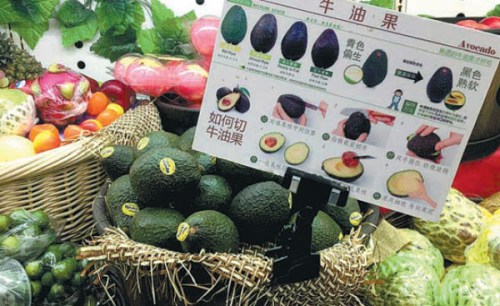
Everything you needed to know about avocados in a Chinese supermarket. (Photo/China Daily)
In 2014, Mexican avocado exports to China were valued at $8.35 million. This represented an increase of 351 percent from 2013 when exports were worth only $1.85 million, according to the Mexican ministry of agriculture.
Higher disposable income for food purchases and changes in dietary habits are seen as the reasons behind the increase in demand.
The fruit has also received praise from nutritionists because of its high content of unsaturated fat and vitamin E, appealing to the health-conscious younger generation.
Huo Zijing, a professional in her mid-20s, eats avocados at least once a week because of its high nutritious value. "I also really like the taste, especially when I eat it with soy sauce and Japanese mustard. It tastes exactly like raw sea urchin," Huo said.
Avocado imports are also expected to see further growth this year. From January to March, Mexico exported 2,600 tons of avocados to China worth $5.5 million. This represented an increase of 486 percent compared to the same period in 2014, according to statistics released by the Mexican ministry of agriculture.
But avocado producers and distributors believe there is still further growth potential by tempting customers living outside first-tier cities.
Although avocado consumption is spreading and more people in China are willing to try the fruit, most consumers are still concentrated in the capital and in the southern part of the country.
"The largest markets today for avocados are Shanghai and Guangzhou, but demand is growing in the second-and third-tier cities," Tommy Padilla, Asia export sales manager at the US-based fruit exporter Mission Produce, said.
For that reason, Chinese fruit distributor Lantao teamed up with Mission Produce last year to introduce Mexican avocados in second-tier cities.
The companies targeted several provincial capitals, including Henan's Zhengzhou, Liaoning's Shenyang and Harbin in Heilongjiang province.
"The new marketing approach through the inner cities will increase consumer recognition of avocados and lead to more Chinese people trying the fruit for the first time," John Wang, chief executive of Lantao, said.
One of the drawbacks here is that the fruit's flavor is neither sweet nor sour. Because of this, avocados are less popular than other tropical and subtropical products such as mango and durian.
The challenge now for distributors is to introduce the fruit outside specialized supermarkets. Mexican producers are also working on increasing consumption by promoting the health benefits of avocados.
Looking ahead, producers and distributors remain confident that exports to China will continue to expand in the coming years.
"We see demand for avocados continuing at a hot pace, and exceeding double-digit growth rates over the next two years," Provost of Lantao said.


















































